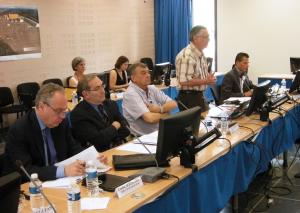Good answers
1 Jul 2011
-
Carlos Alejaldre, Deputy Director-General, Head of the ITER Safety, Quality and Security Department
The Local Commission for Information (CLI) has set up a special work group to analyze the ITER DAC. The document they produced was presented at the last CLI meeting on 17 June in the presence of Yves Lucchesi, sous-préfet of Aix-en-Provence (seated between Carlos Alejaldre and CLI President Roger Pizot, mayor of Saint-Paul-lez-Durance.)
On 21 June, an important meeting relative to ITER's nuclear licensing took place in Fontenay-aux-Roses, outside of Paris. Representatives of the ITER Department for Safety, Quality and Security met with members of the Groupe Permanent—the safety advisory body to the French nuclear regulator ASN that is charged with the technical examination of the ITER nuclear licensing files. This was the mid-course meeting of the examination process.
During a presentation on the status of the examination, the technical advisors to the ASN (IRSN—Institut de Radioprotection et de Sûreté Nucléaire) affirmed that the quality of the answers submitted by the ITER Organization and the strict respect of deadlines opened the way for the establishment of the date for the final Groupe Permanent at the end of November 2011. This was approved by the French nuclear authorities and the president of the Groupe Permanent.
The examination process began back in July 2010. Since then, a thousand questions have been raised by IRSN on the Preliminary Safety Report (RPrS) and we have participated in three or four meetings per month.
In parallel to activities on a national level, here in the region the Local Commission for Information (CLI) is preparing its final commentary on the creation of the ITER Basic Nuclear Installation (INB) under French law. The Special Work Group created to analyze the ITER DAC files also asked more than 300 questions to members of our department in order to prepare its opinion which will be issued next month.
Lastly, the five-week Public Enquiry began on 15 June. During the Public Enquiry, the public has the opportunity to make comments on and ask questions about the ITER project, in particular its environmental impact and safety aspects. Already, many questions have been raised by the President of the Commission.


